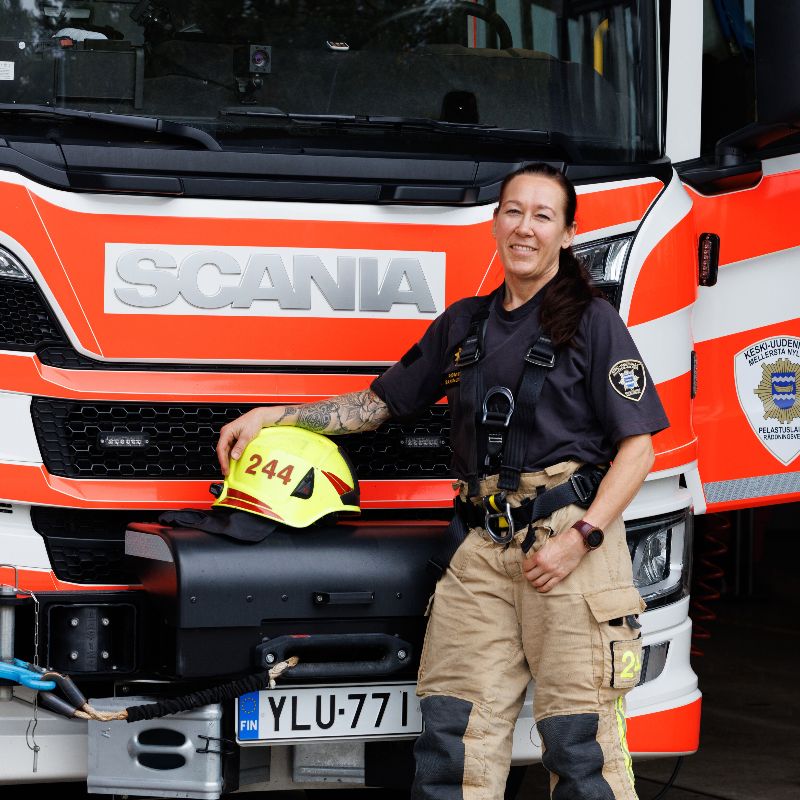Firefighter
"Multidisciplinary skills are an advantage in this profession. Many firefighters already have vocational training in another field, and these skills tend to be very useful in this work. For example, knowing how to use tools helps in working. Flexibility, cooperation and humility are also needed, as going solo does not work in rescue situations."

- Sari Rautiala
- A firefighter at the Central Uusimaa Rescue Services.
- Has completed a firefighter degree at the Emergency Services Academy Finland.
- 29 years of work experience in the field.
Briefly explain what you do for a living.
I work as a firefighter at Vantaankoski fire station, where my work includes fire and rescue services. When the alarm goes off, we go to rescue people, animals and property. Our fire station also handles first response activities, which means that ambulance gigs are driven by a fire extinguishing vehicle when all ambulances are occupied.
How have you ended up in the profession of your choice?
I ended up in this profession accidentally. I have two big brothers, one is a police officer and the other a sports teacher. I also aimed for sport and health sciences myself, but I couldn't even get to the entrance exams, and as for a police officer, I had too bad eyesight. I moved to Kuopio and thought I would try if I could get in to the Emergency Services Academy. I got a study place, and here I am now.
Describe your typical working day or week.
The morning begins by us standing in a row and accepting tasks distributed by the supervisor. After this, we inspect and maintain the equipment. During shifts, we carry out various exercises, which may include studying a new topic in the lecture hall, for example. Recently, we have studied matters related to electric cars.
The day may include, for example, a fire inspection at a day-care centre and the replacement of a lock box in a large company. Lock boxes are metal objects that are mounted to the wall, inside which there is a master key, an automatic fire alarm or a fire extinguishing system central cabinet for the fire brigade. Sometimes this type of work is interrupted when we receive an alarm, for example from a car crash site.
When the evening comes, we often cook together at the fire station. After that, there is a mandatory physical education session, i.e. the possibility of exercising your physical condition if the emergency duties allow it. The night is stand-by duty, and finally we will prepare the equipment for the next shift.
What kind of work environment or working hours do you have?
I spend a lot of time at the fire station, but emergency tasks can be almost anywhere. Although we have good protection against smoke, gases and various poisons, it is important to understand that in this profession you are still exposed to them. Danger is often present in my working environment.
The shifts are regular, which means that they always last 24 hours. The shift begins at 9 a.m. and ends at 9 a.m. the next morning. After that, there will be three days off, the first of which will be the so-called sleeping day.
What kind of competence or qualities are required in the profession?
Multidisciplinary skills are an advantage in this profession. Many firefighters already have vocational training in another field, and these skills tend to be very useful in this work. For example, knowing how to use tools helps in working.
Flexibility, cooperation and humility are also needed, as going solo does not work in rescue situations. The fire station is similar to the army in many ways, i.e. the employee must be able to receive orders and adapt to different situations.
What is the best thing about your profession?
The best part of my profession is the versatility of the work and the work community. My colleagues are awesome.
What are the downsides of the profession or what seems challenging?
It seems that unwanted developments in the world are accelerating all the time. At the moment, we are preparing for different hazardous situations in our work than a couple of decades ago. Threats and risks to us rescuers have also increased.
What would you tell a person considering the profession of a firefighter?
It is worth finding out the physical requirements of the entrance examinations and practising well, to ensure you pass them. If you are considering pay or retirement age when choosing a profession, it should be noted that this is not the best paid work and the retirement age is also quite high in relation to the challenging nature of the work.
How do you see the future of your profession?
Employment prospects are very good, as there is a shortage of firefighters. The work of a firefighter is constantly changing as technology develops, and we must keep up with the development.
